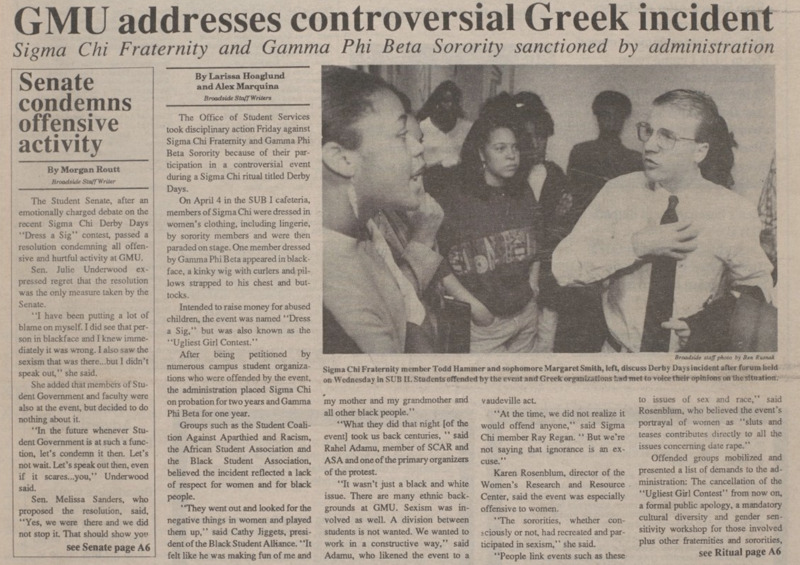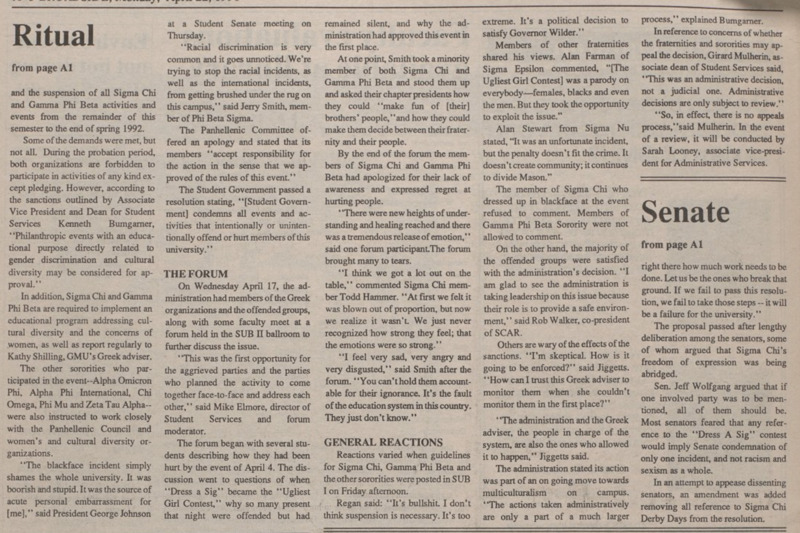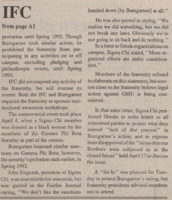1980s and 1990s: The KKK, Mason Days, and Derby Days cont.
The last of the three incidents occurred on April 4, 1991. In the SUB 1 building on campus, the Sigma Chi fraternity and multiple sororities held their yearly Derby Day event. This 1991 iteration was “Dress a Sig,” also known as the “Ugliest Girl Contest.”[1] Reporting on this incident did not come up for nearly two weeks, however the reporting makes it clear what occurred. Women from six fraternities were tasked to dress up Sigma Chi members in female clothing and parade them around. One Sigma Chi member however was dressed very differently. This Sigma Chi member “dressed by members of Gamma Phi Beta sorority, [he] wore a blouse, a wig, blackface and a pillow strapped to his posterior under a skirt.”[2] Returning to a classic tradition for these types of events, it was a fundraiser, this time intended for abused children.[3]
In a turn of events that had not been seen in past cases of racial ridicule, Sigma Chi was quickly reprimanded for their actions by the university. The Student Senate passed a resolution condemning all offensive and hurtful activity at GMU, and the fraternity and sorority were placed on probation.[4] The fraternity was also handed down a prohibition from holding Derby Day activities until 1995 by the Intrafraternity Council Judicial Board – having to also seek approval of any Derby Day activity after that date, along with a mandatory implementation of educational programs on addressing cultural diversity and the concerns of women.[5]
This was the clearest response yet by the university after an issue such as this; clear guidelines were put in place for the participating fraternities and sororities and lines were drawn in the sand – this was not to be tolerated. Though, like the 1985 Air Band contest, the reprimand and outcry for change quickly drew people to the defense of Sigma Chi. Certain students on campus, including the members of Sigma Chi who took part in the event felt that students were being dramatic, and like in 1985 it was all in good fun, or that it held no racial or sexist meaning because that’s not what they intended. Later in the year this also drew direct backlash from Sigma Chi, as they sought to challenge the litany of reprimands placed against them.
Sigma Chi took to the judicial system, charging GMU with restricting its First Amendment rights through its reprimands. Under their First Amendment rights of “expression”, Sigma Chi charged GMU and Dean Kenneth Bumgarner were sued by Sigma Chi for infringing on their right to expression. In an August 27, 1991 ruling, District Judge Claude Hilton ruled “that GMU is ‘enjoined from imposing any discipline’ on Sigma Chi for their members ‘in drag,’ stereotypical portrayal of a black woman.”[6] In the memorandum opinion of the District Court, the ruling stated that the “Plaintiffs' expression occurred at a charity social event in the cafeteria of the student union before an audience composed of students and non-students who paid money to witness a performance. Although the university disagreed with the message propounded by the fraternity's activity, GMU may not discipline the students by infringing on their First Amendment rights based on the perceived offensive content of the activity.”[7] This was a significant blow to the university in its attempts to quell racist activities, and the case went without an appeal from GMU and Dean Bumgarner until the following year, where the original ruling would be upheld.[8]
Signaling a large-scale defeat for the university and Dean Bumgarner, the ruling allowed Sigma Chi to carry on holding events, and kept the fraternity free from all other forms of reprimands placed upon them following the “Dress a Sig” event. With such a shocking ruling, upholding a broad extension of the First Amendment under the freedom of expression, this put GMU in a bind. Without being able to hold Sigma Chi or other fraternities accountable for their potentially racist, sexist, or racially ridiculing actions it would require structural and institutional changes within the university to forcibly ban or end the practices of racial ridicule. As the student body was growing larger and more diverse, it is reported that attempts to quell these types of racist and sexist actions had begun.[9] This ruling surely had to feel like a blow to the administration making an attempt to ameliorate the issues that had gone on for now almost three-and-a-half decades.
[1] Larissa Hoaglund and Alex Marquina, “GMU Addresses Controversial Greek Incident,” Broadside, April 22, 1991.
[2] Peter Baker, “GMU FRATERNITY, SORORITY FACE DISCIPLINE OVER BLACKFACE WALK-ON,” The Washington Post, April 17, 1991.
[3] Larissa Hoaglund and Alex Marquina, “GMU Addresses Controversial Greek Incident,” Broadside, April 22, 1991.
[4] Ibid.
[5] Larissa Hoaglund and Alex Marquina, “GMU Adresses Controversial Greek Incident: ‘Ritual,’” Broadside, April 22, 1991, continued from page 1; Ismail Eithquan, “IFC Rules on Sigma Chi Violations,” Broadside, April 29, 1991.
[6] Jennifer E. Goode, “Judge Ends Sigma Chi Ban,” Broadside, September 3, 1991.
[7] “Iota Xi Chapter of Sigma Chi v. George Mason Univ., 773 F. Supp. 792 (E.D. Va. 1991),” Justia Law, August 27, 1991, https://law.justia.com/cases/federal/district-courts/FSupp/773/792/1608516/.
[8] “Iota Chi Chapter of Sigma Chi v. George Mason Univ., 993 F.2d 386 - U.S. Court of Appeals, 4th Circuit,” accessed June 19, 2023, https://law.resource.org/pub/us/case/reporter/F2/993/993.F2d.386.91-2684.html.
[9] Peter Baker, “GMU INCIDENT ON BLACKFACE THRASHED OUT,” Washington Post, April 18, 1991.





